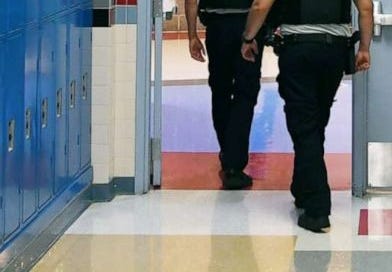Rethinking the School Resource Officers
What should we expect from the SROs? From The Alexandria Times, December 23, 2021
School resource officers became a flashpoint this year in Alexandria. Last May, City Council voted 5-1 to redirect funding for uniformed Alexandria Police Department officers in the public schools to hire additional mental health therapists, a human services specialist, a mentoring partnership coordinator and an additional public health nurse.
School Board member Margaret Lorber said that the School Board’s prior decision to maintain the SRO program was “… based on lengthy deliberation. I concluded that it was not the time to take any resources out of our schools.” Council’s decision to remove SROs contravened the recommendations of the board, ACPS Superintendent Dr. Gregory Hutchings, Ed.D. and the principals of our secondary schools.
SROs are back in schools for the remainder of the school year because on Oct. 12 council reversed itself. Now is the time to think about the SROs, and their roles, in different ways.
It is tempting to consider the appropriateness of uniformed police officers in public schools through personal experiences. These experiences can range from revulsion at the repeated episodes of national police violence to a memory of an unfortunate personal encounter with a police officer.
In Alexandria and elsewhere, the start of this school year involved an abnormally high number of fights and more serious violence. Some of this may be attributable to the pandemic, since more than a year of socialization and adaptation was lost.
Like classroom teaching or the delivery of effective counseling services, the SRO position, and its effectiveness, almost totally depends on attitude, skills and training. If the SRO is simply a presence – a visible deterrent to aberrant student behavior – then the job does not require much more than officers in full body armor with intimidating facial expressions.
The more significant potential value of SROs is in a human relations and counseling context. If classroom teaching is neither art nor science but instead the management of a constellation of relationships, then the same thing is true of being an effective SRO. A respected teacher in ACHS’ International Academy said that prior to the pandemic the most frequent hall pass request the teacher received was from boys who wanted to talk with an SRO about personal concerns.
An overlooked aspect of the SRO position is that, to a large degree, the job is defined by what does not happen. Each time a conflict is defused or a student is convinced to make a better decision there is an unrecorded success that contributes to the welfare of the school. School systems have reporting procedures for fights, but there seems to be no recorded data collection for averted fights and incidents that could escalate but do not.
Attempts to assess the SRO program by focusing on, for example, the number of incidents in schools with or without SROs are incomplete at best. These metrics miss a major part of the job: the prevention of bad things from happening.
Tenants and Workers United, the Alexandria nonprofit advocacy group which adamantly opposed SROs in schools, issued the following statement this fall:
“It’s difficult for us to understand how it’s acceptable to spend $1 million on armed police instead of spending $1 million on holistic approaches, supportive programs, and community-building initiatives in our schools. That doesn’t make sense; we cannot go back to an unaccountable system that has failed students of color for over 20 years.”
Exactly. Why couldn’t SROs operate as an integral and effective part of “… holistic approaches, supportive programs and community-building initiatives” in our schools?
APD’s recent announcement that two SROs have been placed on administrative leave pending the outcome of an investigation about, according to The Washington Post, “… a recent report by a former student about alleged sexually inappropriate conversations that occurred during her time at the school” does not change the essential question: What are the “resources” that school resource officers should provide in our schools?
With SROs temporarily back in ACPS, we should, as a community, work toward a common understanding of what SROs actually do and what we want them to do for our schools and students.
The writer is a former lawyer, member of the Alexandria School Board from 1997 to 2006 and English teacher from 2007 to 2021 at T.C. Williams High School, now Alexandria City High School. He can be reached at AboutAlexandria@gmail.com.




